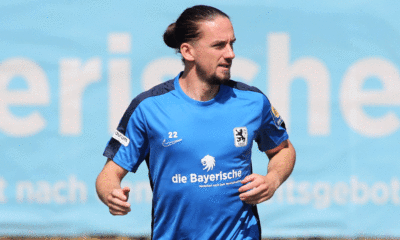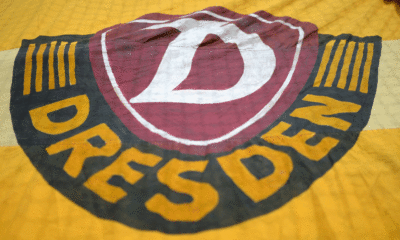Bundesliga
Theses after Dortmund’s draw in Bochum: The standard weakness remains a loyal companion
Published
2 years agoon
By
Maria Keane
The 1-1 draw in Bochum showed two well-known problems for BVB: Dortmund’s full-backs lack the necessary quality and the weakness in offensive standards has long been chronic. At least there is a ray of hope from Dortmund’s point of view. Three theses on Borussia’s draw at VfL Bochum.
Dortmund’s full-backs do not have the necessary format
With his 4-1-4-1 on the wings, Bochum always brings enough staff close to the ball to protect each other and to react at least twice to opposing attacks from the side. It is all the more important for opposing teams who try to use the wings to push their own full-backs or track players there. To get in the back of the midfield back four and move the only six.
BVB tried too often against the low-lying Bochumers through the middle, in the end attacks were almost evenly distributed across the three vertically divided zones left, right and through the center. Now it is a characteristic of the Dortmund Games that BVB likes to develop speed and dynamics through small rotations and filings through the center and the half-tracks. But maybe not always the best idea against Bochum.
Dortmund’s full-backs Thomas Meunier and Nico Schulz hardly dared to go forward for one half, stuck to their low position in the first round instead of vigorously going through the attacks and thus confronting Bochum with bigger tasks on the wings . So the outsider could concentrate on his compactness in the middle and did not have to fear any great danger from the two outer lanes.
Although Meunier was a little livelier in the second half and moved forward, he remained too imprecise in his passing game and with the flanks. And from Schulz too little came in the second half, the left-back was only involved once in the preparation for 20 shots on goal in Dortmund. And that is clearly too little for the high demands of the Dortmunders.
Gregor Kobel will continue to grow with such mistakes
Marco Reus could no longer close the pass path to Christopher Antwi-Adjej, the ball slipped into the depths on Bochum’s attacker. But Reus still tried to keep his goalkeeper Gregor Kobel from taking a hasty action. Reus already suspected what was about to happen – a penalty for Bochum. Antwi-Adjej was neither in a good final position, nor would he have appeared completely naked in front of Kobel.
He could have just shortened the angle and blocked the path of the shot in conjunction with the central defender who was close to the ball. A common scene for Kobel, who turned the game upside down with a completely wrong decision and put his team in “a shitty position”, as he said afterwards.
So far Kobel had been a bank for BVB, a clear improvement in the goalkeeping position compared to the last few years and maybe some people in Dortmund are now wondering whether the malaise will start all over again. In Stuttgart, too, Kobel, who is still a comparatively young and inexperienced keeper in the Bundesliga, made a few mistakes. But the Swiss, who had a healthy self-confidence, neither had to nibble on it for too long, nor did Kobel make a specific mistake in the episode, a second or even a third time.
The faux pas against Bochum should remain a slip, in any case anything else would be a big surprise. Kobel didn’t even try to look for excuses after what he saw as a sobering game. This is usually always a very good sign and shows the right attitude. In any case, BVB does not have a new goalkeeper debate on the heels.
BVB cannot get rid of the standard weakness anytime soon
If you take out BVB’s five penalty goals and just look at the hits after a free kick, a corner or a throw-in, then after 15 matchdays there are a meager three goals. In the Bundesliga, only Bielefeld and Fürth are worse in this ranking – the penultimate and the last in the table and those teams that scored the fewest goals anyway. Freiburg leads this discipline with twelve standard goals, four times the Dortmund result.
Almost symptomatic of the last BVB action in the game against Bochum, when a free kick was taken again briefly, only to be wasted in midfield as a result. Half a dozen free kicks and no less than 15 corners were not enough for BVB to score a goal.
That is also a story of this season: After a small high towards the end of the last season, the offensive standards at BVB are again a major nuisance. There is really no shortage of customers with strong headers, for example. And one or the other targeted shooter should also be found in the squad.
But while other teams – in addition to Freiburg also like Hoffenheim, Frankfurt or Augsburg with always new ideas – turn this discipline, which is always a little underestimated, into a real weapon, Dortmund has been treading on the spot for years. This is also a real problem for Borussia and a reason why important points are always missing at the end of a season.
The problem: For various reasons, it is difficult to rehearse new accents on the pitch. On the one hand, due to the triple workload and English weeks, BVB cannot complete any “normal” units anyway, but only has to train in a dosed and very individualized manner due to the tight schedule.
On the other hand, the cold season of the year is not exactly ideal for learning clear processes for the trainer at temperatures around freezing point with the longer standing times and coaching phases required for this. If BVB wants to improve in this area in the short term, all that remains is intensive video training.


Test match tournament on free TV and live stream
In preparation for the upcoming start of the season in the 2nd and 3rd divisions, SpVgg Unterhaching is organizing a...


Test match on free TV and live stream
Third division club Dynamo Dresden are testing today against top Czech club Slavia Prague in preparation for the upcoming start...


When does the season start?
It’s warm and sunny outside, but you just want to watch football again? Then get in the mood for the...

